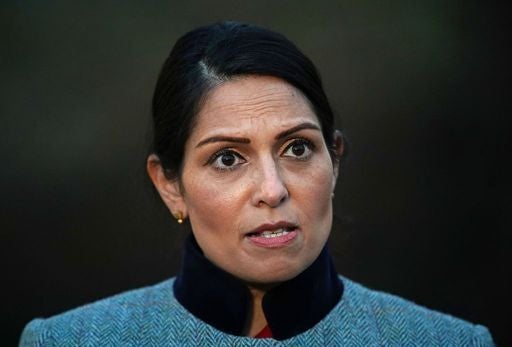Priti Patel tells police to start ‘zapping’ criminals as lockdown laws ease
Home secretary’s words come during trial of police officer accused of murdering former footballer Dalian Atkinson after Tasering him

Your support helps us to tell the story
From reproductive rights to climate change to Big Tech, The Independent is on the ground when the story is developing. Whether it's investigating the financials of Elon Musk's pro-Trump PAC or producing our latest documentary, 'The A Word', which shines a light on the American women fighting for reproductive rights, we know how important it is to parse out the facts from the messaging.
At such a critical moment in US history, we need reporters on the ground. Your donation allows us to keep sending journalists to speak to both sides of the story.
The Independent is trusted by Americans across the entire political spectrum. And unlike many other quality news outlets, we choose not to lock Americans out of our reporting and analysis with paywalls. We believe quality journalism should be available to everyone, paid for by those who can afford it.
Your support makes all the difference.Priti Patel has told police to start “zapping” criminals as coronavirus laws ease.
Addressing the Police Federation annual conference, the home secretary said: “As we come out of the crisis, as we come back to living our lives, we know we’ve got new challenges.
“Cutting crime, going out there and actually zapping the really bad people out there, the criminals that perpetrate high harms.”
Her choice of words came during the trial of a police officer accused of murdering a former footballer after Tasering him and using excessive force in 2016.
Prosecutors claim West Mercia Police Constable Benjamin Monk, who denies murder and manslaughter, used unlawful and unreasonable force during a final 33-second firing of his Taser, and by then kicking former Aston Villa star Atkinson twice in the head.
Ms Patel told the conference that the government would be “backing police” with funding - including for more Tasers - and new powers.
John Apter, chair of the Police Federation, said more than 21,000 officers had been lost since 2010 and the government’s 20,000 recruitment programme would not close the gap or replace senior officers.
He claimed that police pay has fallen by 18 per cent in real terms in the past 10 years. Most officers are also currently affected by the public sector pay freeze.
Mr Apter said police were not permitted to strike over unfair treatment and added: “For years, successive governments have respected this. They have recognised that, in the absence of those industrial rights, police officers should be treated fairly, but in recent years this has changed.”
The home secretary said pay was decided by a review board and the the government has increased police funding by up to an additional £600m this year to recruit new officers.
Ms Patel said a new National Police Leadership Centre was being created to promote officers amid concerns there will not be enough managers for the influx of new constables.
The government has also been criticised for creating new performance measures that police officers fear amount to historic targets.
The home secretary said they were to provide accountability “so that communities can feel and see the benefit of the increased officer numbers on our streets”.
The measures include reducing murder, serious violence and neighbourhood crime, targeting drugs supply and cyber crime, and improving victim satisfaction.
“This is not a return to targets,” Ms Patel said. “It’s not about interfering with the democratic accountability of police commissioners, local police and crime plans, or with the operational independence of Chief Constables.”


